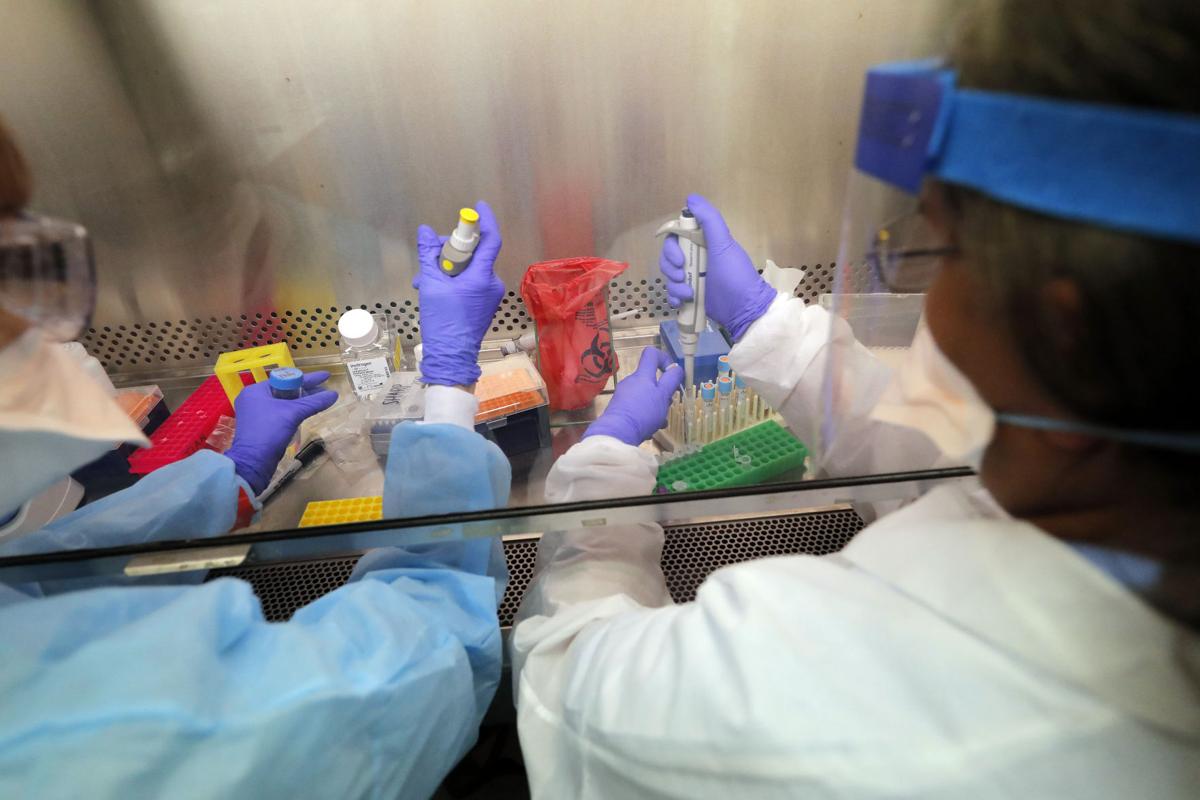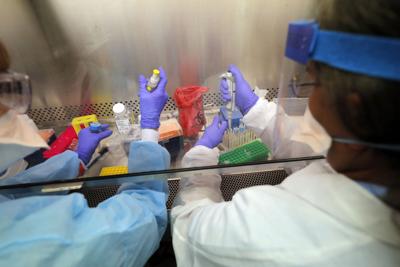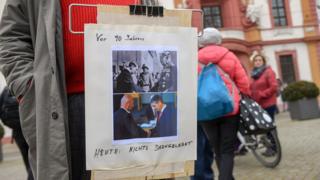Federal government setting up new Louisiana virus test sites

Cindy Morris, left, and Swarnamala Ratnayaka prepare RNA for testing for the new coronavirus at the molecular pathology lab at Tulane University School of Medicine in New Orleans, Thursday, April 2, 2020. The test is identical to the PCR test being used by the Centers for Disease Control to ease the testing crisis and stop the spread of COVID-19, which has hit the New Orleans area especially hard.
Gerald Herbert
BATON ROUGE, La. (AP) — The federal government is setting up five new drive-thru coronavirus testing sites in Louisiana’s capital city region, which is seeing spikes in confirmed cases of the COVID-19 disease.
Baton Rouge’s mayor, Sharon Weston Broome, said most of the sites will open Tuesday and operate seven days a week from 8 a.m. to 4 p.m., with a goal of testing as many as 5,000 people a day. The federally supported test locations, which will use a self-administered nasal swab, will remain up and running through July 18.
“This rapid increase in testing is one of the most important things we can do right now to protect public health and our local economy. Knowing if you have COVID-19 and what to do to prevent further spreading the virus will save lives and lessen the economic impact in our community,” Broome said in a statement. “I implore our residents to take advantage of these testing sites if they have symptoms or were exposed to COVID-19.”
Broome enacted a mask requirement last week for anyone entering a business around the city, as the region sees sizable increases in virus cases and hospitalizations, including an outbreak traced to a cluster of bars near the Louisiana State University campus.
The new testing sites — located at LSU, Southern University, Cortana Mall, a megachurch location and a multipurpose event center in neighboring Ascension Parish — will be supported by the Louisiana National Guard and other state agencies. Results are expected to take three to five days, according to the mayor’s office.
Even as Baton Rouge planned for ramped up testing, New Orleans’ health director worried about what she said were strains on testing capacity.
Dr. Jennifer Avegno said tests in the city are being done at a rate of about 850 per day — well above the 500-per-day needed to meet federal standards for a community the size of New Orleans.
But she said there have been issues getting trays and chemicals needed for large machines used to run the tests. Avegno said the problems have led to some people being turned way from a city testing site. She said the site at Dillard University that opened at 8 a.m. Monday had accepted people for its daily allotment of 150 tests within five minutes and had to direct those in line to other locations.
“There seems to be some raw material shortages,” Avegno said. “There are still supply chain issues with getting these products from China and other places.”
The other problem, she said, is testing demand has increased in other states that have seen surges in cases and realize they need to step up testing. “That’s just putting a strain on the national testing capacity,” Avegno said.
That has led to the city limiting tests and has brought longer wait times for results, a problem that started to surface last week.
“This is obviously something that’s incredibly concerning to us,” Avegno said. She said New Orleans, once an early hot spot for the new coronavirus, was able to “flatten the curve” and begin a limited reopening of restaurants, bars and other businesses thanks, in part, to robust testing.
She said members of Louisiana’s congressional delegation are trying to address the problem.
As businesses reopened around Louisiana, the state has seen a sharp uptick in confirmed cases of COVID-19 and patients who are hospitalized with complications from the disease. Nearly 3,200 Louisiana residents have died from COVID-19, according to the state health department.
A positive coronavirus test led Louisiana’s Office of Motor Vehicles on Monday to close locations in Alexandria, Lafayette, Monroe and Shreveport. The agency said an administrative employee who worked at the different locations, but who didn’t interact with the public, was diagnosed with COVID-19.
For most people, the coronavirus causes mild or moderate symptoms, such as fever and cough that clear up within weeks. But for some, especially older adults and those with existing health problems, it can cause more severe or fatal illness.
Louisiana has more than 66,000 confirmed cases of COVID-19. Public health experts say the actual infection rate is expected to be much higher because many people don’t experience significant symptoms and others never get tested.
Associated Press reporter Kevin McGill in New Orleans contributed to this story.
Follow AP coverage of the pandemic at https://apnews.com/VirusOutbreak and https://apnews.com/UnderstandingtheOutbreak.
Copyright 2020 The Associated Press. All rights reserved. This material may not be published, broadcast, rewritten or redistributed without permission.









